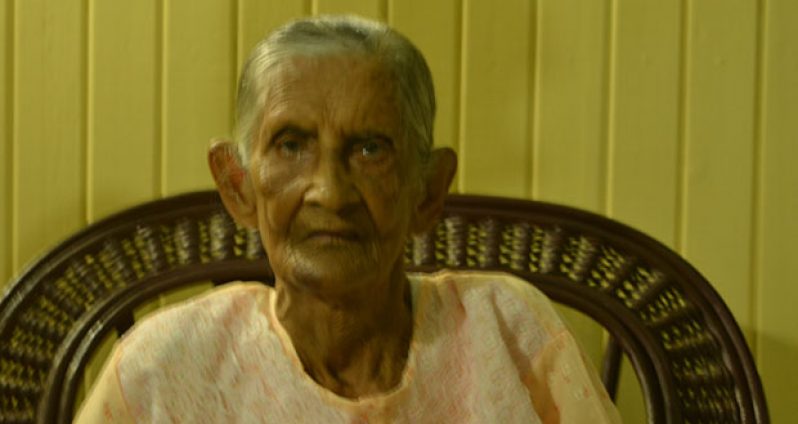— credits longevity to God; dhal and rice and ground provisions
AT 98, Joomrathan Mohabir is frail but still active, and is hoping that Allah The Merciful will grant her her wish to attain the magical hundred before He calls her from this earthly realm.The lot 11 Cotton Field, Essequibo Coast resident, who has outlived two husbands and broken up with another, is mother of three children, all girls, two of whom are twins. She is being cared for by her daughter Shirley, 63, who is one of her twins. Her other two daughters: Shanta, 63, the other twin; and Sheela, 69, live in neighbouring Suriname.
Even at her age, Joomrathan moves about freely — with the aid of a cane. She makes her own bed, and bathes and eats without any help.

Shirley told the Guyana Chronicle, when yours truly visited her home, that her mom, due to her age, does not hear clearly, but does not suffer from any medical complication.
Joomrathan, who greeted the Guyana Chronicle with a robust “Good afternoon”, credits her longevity to “plenty dhal and rice, ground provision and achar”; and most importantly, to God, whom she said wants her to live that long.
The elderly woman related that her mother was from LBI, East Coast Demerara, and her father came from India to work at the LBI sugar estate; but, for some reason, he ended up being posted at Wakenaam, Essequibo Island. She could not remember exactly how her parents met, but presumed that their marriage was arranged, which was the norm in those days with East Indian families.
But she recalled that she was born in Wakenaam, met her first two husbands at Wakenaam, and all of her children were also born there.
In her younger days, Joomrathan related, she used to look after cows and work in the rice fields; and when she attained 13 years of age, her father ‘married her off’ to a policeman: Bholi Bisoondial, whom she said was in his 40s. In those days, policemen enjoyed a level of prestige in society, and, according to Joomrathan, young girls were not allowed to disagree with their parents. As such, she had no choice but to agree to the marriage, but went to live with her husband when she turned 14.
She recalled that all was going well until she found her husband to be unfaithful; and being greatly upset about the situation, she left him.
A few years later, she met her second husband, Pancham Latchman, who was a rice miller from Suriname. She bore him her only three children.
RETURN TO GUYANA
After years of fruitful and productive relationship, Latchman passed away from a heart attack when aged 65; and with his passing, Joomrathan returned to Guyana to live with her mother, who lived at LBI. While in Guyana, she did domestic work to take care of her young daughters; and it so happened — either by luck or chance — that her brother was getting married at Anna Regina, Essequibo Coast, and she went with the baraat (wedding procession). During the celebration, she met her third husband, Parmanand Mohabir, a rice farmer and resident of Cotton Field, and soon after, Joomrathan moved in to live with him there.
The elderly woman described her third marriage as blissful. But on a fateful day 20 years ago, bandits invaded their home, and Parmanand suffered a severe beating; and not long after, he died from a stroke he had contracted.
Joomrathan was 65 then, and her daughters were all grown up. All her husbands had been Hindus and she had assimilated the Hindu culture; but she found something in her life was missing. She was originally a Muslim before her marriages, and on Parmanand’s death, she made a decision to ‘return’ to Islam, where she remains to this day. She also chose to stay with Shirley and have Shirley take care of her.
Shirley told the Guyana Chronicle that she loves her mother dearly; and in her younger days, she used to help her stepfather — who had no children and treated them as his own — in the rice field. The only thing she said she was saddened about was when she was pulled from school at age 13 — not because of poverty, but because in those days the tradition in the Indian family was that girls must not go far in school; at a very young age, they were to marry and take care of their husbands, children, and in-laws.












